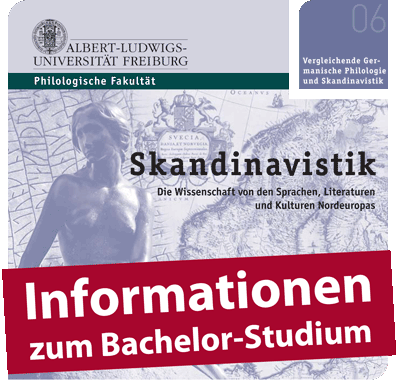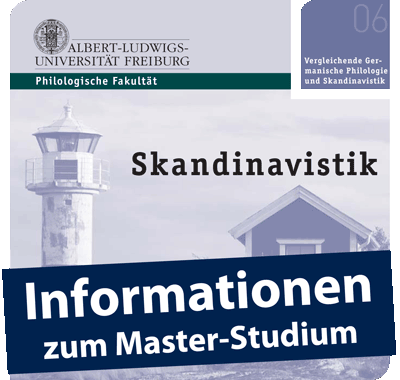Studying
Within the course of Scandinavian Studies, students are given an extensive knowledge of the languages, literature and cultures of Scandinavia and the ability to scientifically reflect and use this knowledge. Students are expected to acquire an active command of one Scandinavian language (main language) as well as reading skills in the other Scandinavian languages and Old Norse.
The wide range of courses in Freiburg allows students to specialize in Studies in Literature and Culture as well as in Linguistics.
Scandinavian Studies can be studied as a major or a minor in the BA Scandinavian Studies programme. The MA History of Scandinavian Literature and Culture programme is based on the BA and includes lectures from the Competence Network Scandinavian Studies (Kompetenznetzwerk Skandinavistik). Scandinavian Studies is part of two interdisciplinary Master programmes offered by the School of Philology, the Master in European Literatures and Cultures and the Master in European Linguistics. Within the framework of EUCOR, students can attend lectures in Scandinavian Studies at the University of Basel and the Université Marc Bloch in Strasbourg. No new students have been admitted to the 'Magister' in North Germanic Philology programme since the winter semester 2006/07 and the programme will definetely end in 2013.
Following the Master's or Magister degree, studies can be continued in a Ph.D. programme at the International Graduate's Academy of the University of Freiburg (Internationale Graduiertenakademie der Universität Freiburg).
Swedish, Danish and Norwegian can also be taken as Additional Courses (Erweiterungsfächer) within the Master of Education (Lehramtsstudium) programme, concluding with the Staatsexamen. All three languages can also be studied as Additional Courses (Ergänzungsfächer) within Diploma programmes in Natural Science and the Diploma programme in Psychology. Details can be found in the course and degree regulations of the Diploma programme in question.
Studies range from the Scandinavian languages to Scandinavian literature and cultures, both older and more recent. A field trip to Scandinavia takes place every two years. We offer language classes in Swedish, Norwegian, Danish, Icelandic and even Saami on a regular basis. We also offer translation, reading and literature classes in these languages, as well as classes focusing on the countries in which the languages are spoken. The standards for these classes are based on the European Framework for Languages (Gemeinsamer europäischer Referenzrahmen für Sprachen). As long as there are still places available, these classes are open to students from all schools and departments and to those students in a BA or BSc programme seeking job-oriented skills ("Berufsfeldorientierte Kompetenzen"- BOK).
No previous knowledge of a Scandinavian language is required in order to take up Scandinavian Studies. At least two Scandinavian languages have to be acquired during the course of studies. Due to this, two semesters are added to the semester total, which means that exams can be postponed accordingly and that the payment of certain fees, the 'Langzeitstudiengebühren', is also postponed by two semesters. There are no special restrictions regarding admission to any of the Scandinavian Studies programmes.
The Department of Scandinavian Studies in Freiburg has been closely cooperating with the departments of Scandinavian Studies in Tübingen, Strasbourg and Basel for several years. These Institutions founded the transnational Competence Network Scandinavian Studies (www.skandinavistik.net) in 2003. Together they make up the largest department of this field of study outside of Scandinavia. Students from France, Germany and Switzerland study together in seminars and lectures, which in part take place online, and thereby acquire important skills for the transnational European market place.



